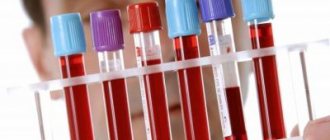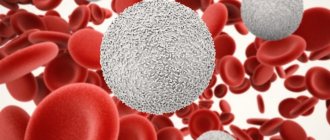Human chorionic gonadotropin, or hCG, is a protein produced by the membranes of a developing embryo. It is responsible for the course of pregnancy, blocking menstruation, and helps increase the concentration of hormones that are needed to preserve the fetus. The presence of hCG in a woman’s blood is one of the early signs of conception. It must be said that the human pituitary gland produces a small amount of hCG, so in some cases a small concentration of it can be found in the blood of men and women (including those in menopause).
How to take hCG
During pregnancy, blood must be donated on an empty stomach, and at least eight hours must pass after the last meal. Keep in mind that drinks also count as meals. You are only allowed to drink water in the morning, and it is better to do this for the last time no later than half an hour before the test. If you monitor hCG concentrations over time, then you need to take a blood test at the same time of day, preferably in the morning. A blood test for pregnancy, like all hormone tests, is taken from a vein. If blood collection is not tolerated, you can ask the nurse to perform the procedure in a lying position. During comprehensive pregnancy screening, it is better to undergo an ultrasound and test on the same day. This will allow the doctor to get a more complete picture of the development of the fetus. As a rule, the results of the hCG analysis are ready within 1-3 days.
The role of the hormone in diagnosing pregnancy
Analysis of the amount of total hCG occupies a special place in confirming pregnancy in the early stages.
This is due to the fact that the hormone begins to be actively released a few days after the fertilized egg attaches to the wall of the uterus. During normal development of the embryo, the level of the substance doubles every 1.5-2 days. By the tenth week, the amount of hCG in a woman’s tests can reach maximum values - up to 225,000 mU/ml. Simultaneously with blood tests for total hCG, the pregnant woman is also prescribed other examinations. So the patient must visit the ultrasound scanning room at least three times. Several studies may be required over a period of nine months. Comprehensive 1st and 2nd trimester screenings also include an hCG test.
Blood for hCG: when to donate
It is advisable to take a blood test to detect the level of hCG to establish the fact of pregnancy seven days (or later) after the expected conception. Quantitative indicators of hCG in the blood make it possible to accurately determine the duration of pregnancy. Further observation of changes in hCG levels allows you to understand how harmoniously the pregnancy is progressing. A doctor may prescribe an hCG test during pregnancy as part of the 1st comprehensive screening - a double test, in the third month of gestation or as part of a second examination - a triple test, in the fourth - fifth month of pregnancy. In the first trimester, regular monitoring of hCG levels is especially important if there is a risk of spontaneous abortion; in the second trimester, it allows the doctor to track the dynamics of fetal development.
The actual date of conception in pregnant women with late ovulation and an unstable cycle, as a rule, is quite different from the period that doctors assume. In this case, the actual gestational age can be assumed by analyzing hCG: its elevated level will allow us to judge the current period.
HCG: the main test for pregnant women
One of the main tests during pregnancy is the hCG test. What role does this hormone play in the body? What is the essence of the analysis? Maria Aleksandrovna Petrova, an obstetrician-gynecologist at the Expert Clinic Smolensk, answered these and other questions.
– Maria Alexandrovna, what is hCG?
– HCG (human chorionic gonadotropin) is a hormone that is normally produced only in the body of a pregnant woman and nowhere else. In other words, it does not occur normally in non-pregnant women, men, children, and the elderly.
The hormone is produced by chorion tissue. This is one of the leaves of the future embryo. When a zygote (fertilized egg) is formed, hCG can be detected in a woman’s blood approximately on the sixth day after conception.
– What functions does this hormone perform in the human body?
– HCG is a very important hormone. It regulates the functioning of a woman’s entire body in the first trimester of pregnancy. Firstly, under the influence of hCG, the corpus luteum, which is formed in every cycle in a woman and disappears 10–12 days from the moment of its formation, in this case does not disappear anywhere, but actively functions up to 10–12 weeks. The corpus luteum, as we know, produces progesterone, which must be sufficient in a woman’s body to maintain normal growth and development of pregnancy. And until the placenta takes over the function of producing progesterone, it is performed by the corpus luteum, which cannot exist for long without hCG.
Secondly, to some extent, human chorionic gonadotropin has corticotropic properties, increasing the production of hormones (in particular, cortisol) in the adrenal cortex and promoting functional hyperplasia of the adrenal cortex in a pregnant woman.
During pregnancy, the entire body begins to live its own life: the third circle of blood circulation (placenta-fetus) is formed, the entire musculoskeletal system begins to be rebuilt. This is a significant stress for the body that a woman must cope with. And cortisol helps her with this.
Read more about the adrenal glands in our article
In addition, thanks to hCG, a woman’s immune system is physiologically weakened, which is also very important. After all, fifty percent of the unborn child is foreign material for our body. And if immunity does not decrease, then, unfortunately, miscarriages occur.
– What types of hCG tests are there? What is their essence?
– The two main tests for hCG are qualitative and quantitative. A qualitative analysis is performed to determine whether there is a pregnancy or not. And thanks to quantitative analysis, you can judge how the pregnancy is developing. Normally, hCG should increase two to three times every two to three days.
Two main tests for hCG -
it is qualitative and quantitative
– Maria Alexandrovna, when does a doctor prescribe a hCG test?
– The main indication is to find out whether there is a pregnancy in the body or not. The test may not yet show pregnancy, and the ultrasound may not yet show the fertilized egg, but hCG will definitely answer this question for us.
We also prescribe this test for menstrual irregularities and any abnormal uterine bleeding in order to exclude pregnancy. Without the presence of hCG we cannot do this.
And, of course, we prescribe hCG when we monitor the progress of pregnancy.
In addition, there are, for example, oncological diseases, such as chorionic carcinoma or hydatidiform mole, which will also be accompanied by the production of hCG. Determination of this marker is one of the tests performed in the diagnosis of these diseases.
– What does an elevated hCG mean?
– It is very difficult to say which hCG levels are elevated and which are reduced during pregnancy. Because if we look at the table of limits of normal values for each stage of pregnancy, they are very wide. But if we say that the numbers are inflated in several consecutive analyses, then this may indicate, for example, a multiple pregnancy.
In addition, hCG may increase when there is a threat of miscarriage, in the presence of diabetes mellitus, or certain cancer diseases.
– What does a low hCG level indicate?
– Here it is more correct to talk not about a low level of hCG, but about a slow increase in hCG. Most often it occurs during ectopic (ectopic) pregnancy, when it is not located in the uterus, but in the tube, ovary or abdominal cavity.
More information about ectopic pregnancy can be found here
HCG will also increase more slowly during anembryony (non-developing pregnancy), when there is a fertilized egg, but there is no embryo in it.
These are the main points when hCG is low.
– How to take hCG? Is any preparation needed?
– Blood is donated for hCG strictly on an empty stomach. Preferably in the morning. The day before, as with any blood donation from a vein, it is advisable not to drink alcohol, fatty, fried, or spicy foods.
You may also be interested in our materials on other types of analyzes:
How to properly take a general blood test?
Leukocytes. What will a blood test tell you?
Platelets: friends or enemies?
What does a biochemical blood test show?
Not only a colonoscopy: what will a stool test tell you?
Diagnosis of infections using PCR: what is it?
– How accurate is the hCG blood test?
– If we are talking about a qualitative analysis for hCG, then this is the gold standard for detecting pregnancy. Nothing more accurate than hCG will tell us whether a woman is pregnant or not. If we talk about quantitative analysis, this is also a fairly objective research method that allows you to track whether the pregnancy is developing well or whether there are any difficulties.
You can make an appointment with an obstetrician-gynecologist here
ATTENTION: the service is not available in all cities
Interviewed by Marina Volovik
The editors recommend:
On your marks! What tests need to be taken when planning a pregnancy?
Preparing for pregnancy: necessary diagnostics
Do not count your chickens before they are hatched. What time of year should you plan to get pregnant?
For reference:
Petrova Maria Alexandrovna
Graduate of the Faculty of Medicine of the Smolensk State Medical Academy in 2011.
From 2011 to 2013 she completed a residency in obstetrics and gynecology.
Currently, he is an obstetrician-gynecologist at the Expert Clinic, Smolensk.
Receives at the address: st. 8 March, no. 20
Tests during pregnancy
Prenatal screenings determine the level of not only hCG, but also b-hCG, a component of human chorionic gonadotropin, the quantitative indicators of which allow the specialist to judge how harmoniously the pregnancy is proceeding. From the first to the second semester, the amount of this hormone fraction should progressively decrease. This indicates normal fetal development. Excessive or insufficient amounts of b-hCG should be a reason for additional examinations. As for hCG itself, its level increases progressively and, as a rule, reaches a peak by the seventh week of pregnancy, after which it gradually decreases. By the end of pregnancy, its concentration reaches a level of 15,000-60,000 IU/l.
Changes in hCG in oncology
Normally, hCG is synthesized in small quantities. Its production increases significantly in women during pregnancy. Deviation from normal values indicates pathology. Low levels of the hormone indicate the presence of health problems only during pregnancy. In all other cases, the decrease in indicators is explained by the individual characteristics of the body and does not pose a threat to health. An increase in hCG can serve as a tumor marker. For example, exceeding the norm is typical for chorionic carcinoma. The cells of this neoplasm are capable of producing hCG. This pathology often develops after an abortion. Increased production of the hormone is also observed in malignant testicular tumors. Hormone synthesis occurs in the embryonic tissues of the neoplasm. An increase in indicators can also be observed with uterine cancer. HCG serves as a marker not only for cancer of the reproductive system, but also for malignant neoplasms of the kidneys, gastrointestinal tract, and lungs. Some types of neoplasms of these organs contain germ cells and are capable of producing hCG.
The hormone has 100% sensitivity in diagnosing neoplasms such as chorionic carcinoma, some types of gastrointestinal and genitourinary cancers, and germ cell neoplasms. Using this analysis, malignant testicular tumors are differentiated from benign tumors. This test is prescribed in combination with other tumor markers and instrumental studies. Based on the results of all the data obtained, an accurate diagnosis is made and the most effective treatment method is selected. Timely diagnosis allows in many cases to achieve a complete cure and save the patient’s life. It is important to immediately consult a doctor if negative changes occur in your health status to get examined.
The hCG test is of high importance in monitoring the condition of patients diagnosed with cancer who are undergoing treatment or have already completed it. Based on its results, the success of treatment and the presence of relapses are judged.
HCG analysis: decoding
| gestational age | hCG norm, IU/L | |
| weeks from conception | obstetric weeks | |
| 1 — 2 | 3 — 4 | 25 — 300 |
| 3 — 4 | 5 — 6 | 1500 — 5000 |
| 4 — 5 | 6 — 7 | 10000 — 30000 |
| 5 — 6 | 7 — 8 | 20000 — 100000 |
| 6 — 7 | 8 — 9 | 50000 — 200000 |
| 7 — 8 | 9 — 10 | 40000 — 200000 |
| 8 — 9 | 10 — 11 | 35000 — 140000 |
| 9 — 10 | 11 — 12 | 32500 — 130000 |
| 11 — 12 | 13 —14 | 27500 — 110000 |
| 13 — 14 | 15 — 16 | 25000 — 100000 |
| 15 — 16 | 17 — 18 | 20000 — 80000 |
| 17 — 21 | 19 — 23 | 15000 — 60000 |
HCG analysis decoding.
HCG analysis: explanation, 1st trimester (B-fraction)
| week of pregnancy | b-hCG norm, ng/ml |
| 9 | 23,6 — 193,1 |
| 10 | 25,8 — 181,6 |
| 11 | 17,4 — 130,4 |
| 12 | 13,4 — 128,5 |
| 13 | 14,2 — 114,7 |
HCG analysis: explanation, 1st trimester (B-fraction)
HCG blood: decoding, 2nd trimester (B-fraction)
| week of pregnancy | b-hCG norm, ng/ml |
| 14 | 8,9 — 79,4 |
| 15 | 5,87 — 62,0 |
| 16 | 4,67 — 50,0 |
| 17 | 3,33 — 42,8 |
| 18 | 3,84 — 33,3 |
HCG blood: decoding, 2nd trimester (B-fraction)
HCG by week of pregnancy
The table below gives an idea of how hCG changes by week of pregnancy during the first trimester and then into the second trimester (when it starts to fall). For a detailed interpretation of hCG blood tests, it is best to consult a doctor.
| Gestational age | HCG level (mIU/ml) |
| 3 weeks | 5–72 |
| 4 weeks | 10–708 |
| 5 weeks | 217 — 8245 |
| 6 weeks | 152 — 32 177 |
| 7 weeks | 4059 — 153 767 |
| 8 weeks | 31 366 — 149 094 |
| 9 weeks | 59 109 — 135 901 |
| 10 weeks | 44 186 — 170 409 |
| 12 weeks | 27 107 — 201 165 |
| 14 weeks | 24 302 — 93 646 |
| 15 weeks | 12 540 — 69 747 |
| 16 weeks | 8904 — 55 332 |
| 17 weeks | 8240 — 51 793 |
| 18 weeks | 9649 — 55 271 |
HCG analysis: price
Prices for determining the level of hCG in the blood vary - from 255 to 800 rubles. The Lab4U laboratory can accurately and quickly determine the level of hCG. The price of such a study will be 50% less than the cost of similar studies in Invitro, Gemotest and other laboratories. Remember that if you take hCG as part of pregnancy monitoring (weekly), then it is better to do this in one laboratory, since the hCG levels in different laboratories are not the same and depend on the research method, reagents, etc. The Lab4U laboratory always indicates reference values of analysis results. All you have to do is compare them with your own result. You can also inquire about the acceptable ranges of hCG hormone concentrations during your week of pregnancy from your doctor or Lab4U laboratory technician. Remember that only a doctor can give a detailed interpretation of the test results, taking into account your individual state of the body, concomitant diseases, and characteristics of the course of pregnancy.
What fetal anomalies cause changes in hCG levels?
The level of this hormone may change in the following diseases and conditions:
- Down syndrome. In this situation, there is an increased hCG and at the same time low levels of other markers.
- Patau , Edwards (low hCG and other markers).
- Turner syndrome (hCG unchanged, other markers below).
- Serious fetal heart and neural tube defects.
If there is a high risk of developing abnormalities, the doctor may recommend additional tests and examinations. Invasive diagnostics provide highly accurate results . In addition, taking into account the duration of pregnancy, other research methods are used:
- amniocentesis;
- chorionic villus biopsy;
- cordocentesis.
If the screening shows unsatisfactory results, it is important to consult with a geneticist and find out what to do next.
Sometimes, for example, with multiple pregnancies , screening is very difficult or impossible. In this case, hCG increases in proportion to the number of fetuses that develop. However, it is very difficult to calculate the risk for each child individually.
Reduced amount of hCG
Reduced concentrations of human chorionic gonadotropin in the blood plasma of the expectant mother are observed in the following cases:
- With an ectopic pregnancy (hCG levels rise very slowly or stop growing altogether);
- A difference from normal values of more than half the reference value may indicate a risk of miscarriage;
- In case of development of chronic placental insufficiency;
- Increasing the amount of hCG.
A significant increase in the level of hCG in the body of the expectant mother leads to:
- In case of early toxicosis or gestosis;
- During multiple pregnancy (hormone levels increase in proportion to the number of fetuses);
- With intrauterine infection;
- In case of complications of pregnancy with diabetes mellitus;
- With chorionepithelioma;
- With hydatidiform mole;
- In case of fetal chromosomal abnormalities;
- In case of regular use of gestagen.
What is hCG used for?
When determining HCGb levels, you need to understand what human gonadotropin is needed for. Wikipedia states the following:
- this hormone at the beginning of pregnancy stimulates the process of synthesis of estrogen and progesterone ;
- prevents the disappearance of the corpus luteum ;
- prevents aggression immune system against fetal cells;
- initiates physiological and anatomical changes in the pregnant woman’s body;
- stimulates the adrenal glands and gonads of the fetus;
- participates in the process of sexual differentiation in male fetuses.




